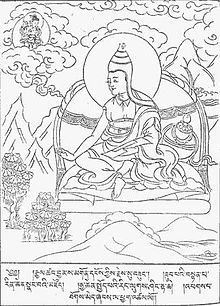Asanga
Asanga ( skt .: Asaṅga ; Tib .: thogs med ; also: Aryasanga ; 4th century ) was a representative of the Yogacara school of Buddhist philosophy. Asanga and his half-brother Vasubandhu are traditionally regarded as the founders of Yogacara.
Asanga was born in Purusapura , today's Peshawar , as the son of a member of the Kshatriya caste. Originally, Asanga was probably taught in the philosophy of Mahisasaka or Mulasarvastivada and later converted to Mahayana . After many years of meditation , during which, according to some Buddhist traditions , he is said to have been to Tushita many times , he received the teachings of Maitreyanatha , who is also seen as another founder of the Yogacara.
Many important works of the Yogacara come from Asanga, u. a. the Abhidharmasamuccaya (cf. Abhidharma ), his summary of the Yogacarabhumi and his commentary on Uttaratantrasastra .
The Faxiang zong ( Xuanzang ) also refer to the writings of Asangas and Vasubandhus.
literature
- Giuseppe Tucci: On Some Aspects of the Doctrines of Maitreya (natha) and the Asanga, being a course of five lectures delivered at the University of Calcutta - Calcutta, 1930. Reprint 1975 by Chinese Materials Center in San Francisco, (OL17297682M)
- Thrangu Rinpoche (author), Jules Levinson (trans): Distinguishing Dharma and Dharmata by Asanga and Maitreya, 1999. ISBN 8170307163
- John P. Keenan: The Summary of the Great Vehicle by Bodhisattva Asanga , Berkeley, CA: Numata Center for Buddhist Translation and Research 1992. ISBN 1-886439-21-4 (Taishō vol. 31, no 1593).
Web links
- Literature by and about Asanga in the catalog of the German National Library
- Carola Roloff: Asanga, Tibet and Buddhism, October November December 2004, issue 7, pp. 20–22 tibet.de (PDF; 190 kB)
- himalayanart.org: Indian Teachers - Asanga
- tbrc.org: asanga
Individual evidence
- ^ KTS Sarao: Vasubandhu. In: Internet Encyclopedia of Philosophy .
- ↑ The Huey Lee: Xuanzang (Hsan-tsang) (602-664 CE). In: Internet Encyclopedia of Philosophy .
| personal data | |
|---|---|
| SURNAME | Asanga |
| ALTERNATIVE NAMES | Asaṅga; thogs med; Aryasanga |
| BRIEF DESCRIPTION | Buddhist philosopher |
| DATE OF BIRTH | 4th century |
| DATE OF DEATH | 4th century or 5th century |
